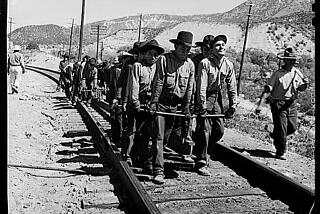RELIGION / JOHN DART : Scholar Disputes Exodus Story : Bible: The account of Israelites enslaved by Egyptians doesn’t hold with history, says a speaker at a Cal State Northridge symposium.
- Share via
The biblical account of Israelites held in bondage by ancient Egypt--a vital element of the Exodus story that has given hope of liberation to centuries of Jews and African-Americans--was challenged as unhistorical by a black scholar at a recent public symposium at Cal State Northridge.
“There is no historical evidence of Egyptians holding the nation of the Hebrews captive,” said Maulana Karenga, chairman of Cal State Long Beach’s department of black studies. “In terms of historical documentation, to my knowledge, there is no evidence. No scholar of any standing makes such a claim.”
Karenga’s position that most scholars deny the historicity of Israelite slavery was disputed during the symposium by James Goss, chairman of the Cal State Northridge religious studies department. And in an interview Friday, David Noel Freedman, editor in chief of the Anchor Bible Dictionary, said there is a range of opinion within scholarship.
Though documents and other conventional proof is lacking, Goss and Freedman also said that the story of Israelites enduring forced labor--not domestic slavery but obligations to perform public works--and then leaving Egypt to settle in Canaan is unlikely to have been repeated for centuries unless it contained some truth.
The provocative issue came up Wednesday night during a three-hour symposium led by three African-American scholars and the Rev. Cecil (Chip) Murray, senior pastor of the First African Methodist Episcopal Church in Los Angeles.
The symposium, dealing with contributions of black scholarship to religious studies and church thinking, was co-sponsored by the departments of religious studies and Pan-African studies on the Northridge campus.
Karenga, author of the widely used textbook “Introduction to Black Studies,” treated ancient Egypt as part of African culture rather than as part of the Middle Eastern milieu as historians have done traditionally.
He claimed that many ancient Egyptian religious practices and concepts were later adopted and reshaped in the Hebrew Bible and in Christian doctrine.
While acknowledging that scholars debate whether parallel ideas signify influence from one culture to another or are simply coincidences, Karenga nevertheless suggested that Egyptian creation accounts contributed to those in the Hebrew Bible, that Hebrew monotheism begins with the Egyptian god Ra and that Osiris was the first of 16 risen-savior figures in ancient history, Jesus being the last.
On these Egypt-as-forerunner theories and others, which he described hastily due to time constraints, Karenga was not challenged. However, he was questioned about his assertion that no historical basis exists for Jews being slaves in Egypt.
Karenga made the claim in order to explain the academic resistance to theories of contributions from ancient Egypt. “The Hebrews, and now the Jews and Christians, have assigned Egypt as the land of bondage,” he said, implying that scholars would not want to give credit for religious originality to the villainous Egypt of the Pharaohs.
“This is an essentially political myth created to construct nationhood,” Karenga said. He asked rhetorically, for instance, why the Bible’s Book of Exodus does not give a name to the Pharaoh if it is indeed historical.
Karenga said that he was not trying to destroy anyone’s faith, but insisted that in an intellectual discussion it was necessary to be objective and candid.
From the audience, the Rev. Garth Baker-Fletcher, the husband of panelist Karen Baker-Fletcher of the School of Theology at Claremont, said that Karenga was making a disturbing distinction between faith and history.
Karenga is not alone, however, in questioning the historical veracity of bondage in Egypt.
The Anchor Bible Dictionary, published last year, favors Egyptian bondage as basically historical but nevertheless cites two studies published in 1988 that cast doubt. One wrote that “it is quite probable that Semitic people first settled in Egypt and then left it, but in this case, it is absolutely impossible to verify the event.” The other termed traditions about the exodus of Israelites “legendary and epic in nature.”
Harper’s Bible Dictionary, published in 1985 as a project of the Society of Biblical Literature, said that the accounts of Egyptian slave labor must have been the historical experience of some groups of Hebrew ancestors. “In the long process of the development of the tradition, however, the details needed for modern historians to date and explain this experience were lost,” according to the entry on Exodus.
Freedman said that biblical scholarship embraces a wide spectrum of opinion--from those who would deny any historicity to those who would accept the whole story. The 71-year-old scholar is professor emeritus from the University of Michigan and holds an endowed chair in Hebrew biblical studies at UC San Diego.
“Most aging white male scholars take a moderate view of this,” Freedman said.
“If you apply the legal criterion of ‘beyond reasonable doubt,’ there is almost nothing you can affirm,” he said. “First, there is no documentary or inscriptional or archeological evidence, as far as I know, that would prove that Israelites really were enslaved.
“But I would say the biblical account, without trying to force the issue, is reasonable. One question is why people would invent having been enslaved if it wasn’t true. There is the element of embarrassment,” he said.
More to Read
Sign up for Essential California
The most important California stories and recommendations in your inbox every morning.
You may occasionally receive promotional content from the Los Angeles Times.













![Vista, California-Apri 2, 2025-Hours after undergoing dental surgery a 9-year-old girl was found unresponsive in her home, officials are investigating what caused her death. On March 18, Silvanna Moreno was placed under anesthesia for a dental surgery at Dreamtime Dentistry, a dental facility that "strive[s] to be the premier office for sedation dentistry in Vitsa, CA. (Google Maps)](https://ca-times.brightspotcdn.com/dims4/default/07a58b2/2147483647/strip/true/crop/2016x1344+29+0/resize/840x560!/quality/75/?url=https%3A%2F%2Fcalifornia-times-brightspot.s3.amazonaws.com%2F78%2Ffd%2F9bbf9b62489fa209f9c67df2e472%2Fla-me-dreamtime-dentist-01.jpg)